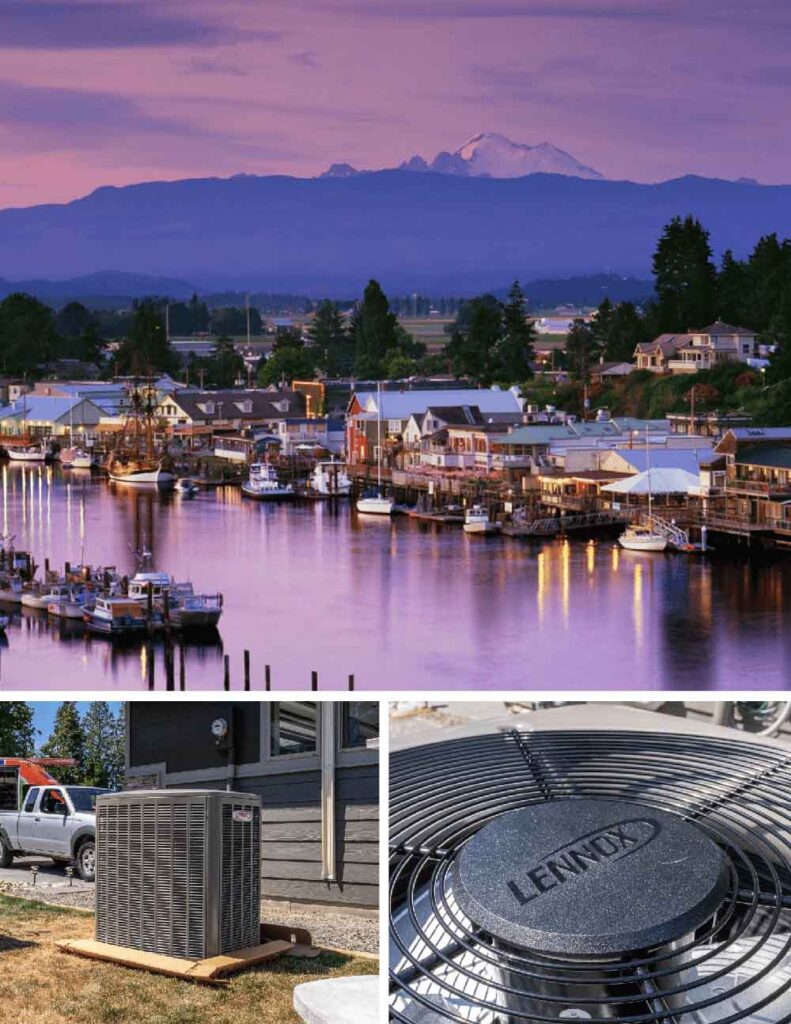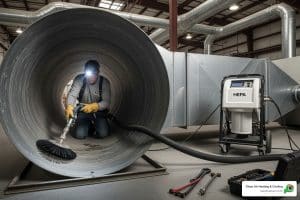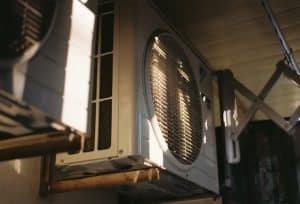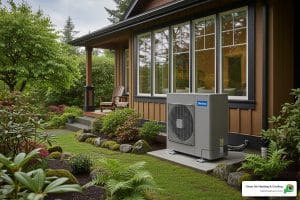Top Tips for Air Conditioning Installation in Mount Vernon, WA
When it comes to air conditioning installation in Mount Vernon, WA, you want to ensure you’re making informed decisions for your home. Whether you’re looking to beat the summer heat or improve your home’s energy efficiency, the right AC installation can make all the difference.
Quick Facts:
- Importance: Proper installation extends the life of your AC and boosts energy efficiency.
- Benefits: Enjoy a cooler home, lower utility bills, and increased comfort.
- Professional Services: Contact Clean Air Heating & Cooling for expert installation and maintenance.
Installing an air conditioner isn’t just about comfort—it’s about ensuring your home runs efficiently and safely. Quality installation can help avoid common pitfalls like improper sizing or poor ductwork, which can lead to higher energy bills and reduced performance.

Understanding Air Conditioning Installation
What Does AC Installation Include?
When it comes to air conditioning installation in Mount Vernon, WA, the process involves several key steps to ensure your system runs smoothly and efficiently. Here’s a breakdown:
- Mounting Units: The indoor and outdoor units need secure mounting. The indoor unit is usually placed on a wall or ceiling, while the outdoor unit is set on a concrete pad or mounted on brackets.
- Copper Pipe Installation: Copper pipes connect the indoor and outdoor units, allowing refrigerant to flow between them. Proper insulation of these pipes is crucial to prevent energy loss.
- Electrical Wiring: Electrical connections are established between the units and your home’s power supply. This step includes installing circuit breakers and ensuring all wiring meets local codes.
- Ductwork (if applicable): For central air systems, ductwork is essential. Properly sized and sealed ducts distribute cool air throughout your home.
- Permits: Before starting the installation, you may need permits from local authorities. These ensure the work complies with safety and building codes.
Each of these steps requires precision and expertise. That’s why professional installation is highly recommended.
Cost of Air Conditioning Installation in Mount Vernon, WA
The cost of air conditioning installation in Mount Vernon, WA can vary widely based on several factors. Here’s what you need to consider:
- Average Cost: The typical cost ranges between $3,000 and $7,000. This includes the unit, labor, and additional materials.
- Factors Affecting Cost:
- Type of System: Central air systems tend to be more expensive than ductless mini-splits or window units.
- Ductwork: If your home doesn’t already have ductwork, installing it can add significantly to the cost.
- Home Size: Larger homes require more powerful units, which are more expensive.
- Energy Efficiency: Higher SEER-rated units cost more upfront but save money in the long run.
For instance, if you opt for a high-efficiency central air system with extensive ductwork, your costs will be on the higher end. However, this investment can lead to lower utility bills and enhanced comfort.
By understanding what’s involved in air conditioning installation in Mount Vernon, WA, you can make informed decisions and ensure your home stays cool and comfortable. For expert installation and advice, contact Clean Air Heating & Cooling.
Types of Air Conditioning Systems
Choosing the right air conditioning system for your home is crucial for comfort and efficiency. Here, we’ll explore the three main types: central air conditioning systems, ductless mini-split systems, and heat pump systems.
Central Air Conditioning Systems
Central air conditioning systems are popular for their ability to cool an entire home through a network of ducts. These systems have a large outdoor condenser that draws in hot air, cools it, and distributes it through ductwork.
Efficiency: Central air systems are highly efficient, especially when paired with well-sealed and insulated ductwork. Modern units often come with high SEER (Seasonal Energy Efficiency Ratio) ratings, which means they use less energy to cool your home.
Ductwork: Installing central air requires extensive ductwork throughout your home. If your home lacks existing ducts, this can significantly increase installation costs.
Installation: The installation process involves mounting the outdoor condenser, running copper pipes and electrical wiring, and connecting everything to the indoor air handler. This comprehensive setup ensures that cool air reaches every room in your home.
Ductless Mini-Split Systems
Ductless mini-split systems offer a flexible alternative to central air. They consist of an outdoor unit connected to one or more indoor air handlers, without the need for ductwork.
Flexibility: These systems are perfect for homes without existing ductwork or for adding cooling to specific rooms. Each indoor unit can be controlled independently, allowing for customized comfort in different areas.
Installation: Installation is simpler than central air systems. Technicians mount the indoor units on walls and connect them to the outdoor unit via a small conduit that houses the refrigerant line, power cable, and drain line.
Maintenance: Mini-splits require regular maintenance, including cleaning filters and checking refrigerant levels. However, they tend to be easier to maintain than central systems due to their simpler design.
Heat Pump Systems
Heat pump systems are versatile units that provide both heating and cooling by transferring heat between the indoors and outdoors.
Energy Efficiency: Heat pumps are known for their energy efficiency. They can save up to 50% on energy bills compared to traditional heating and cooling systems. This is because they move heat rather than generate it.
Dual Functionality: One of the standout features of heat pumps is their ability to both heat and cool your home. This dual functionality makes them a cost-effective option for year-round comfort.
Installation: Installing a heat pump involves setting up an outdoor unit and connecting it to an indoor air handler or ductwork. The process is similar to that of central air systems but with the added complexity of ensuring the system can switch between heating and cooling modes effectively.
Understanding the different types of air conditioning systems can help you choose the one that best fits your needs. For personalized advice and professional installation, reach out to Clean Air Heating & Cooling.
Choosing the Right AC System for Your Home
Selecting the right air conditioning system can make a big difference in your home’s comfort and energy bills. Here are some key factors to consider:
Factors to Consider
Home Size: The size of your home is crucial. Larger homes usually need more powerful systems or multiple units to cool effectively. For example, a central air conditioning system might be ideal for a big house, while a ductless mini-split system could be perfect for smaller homes or individual rooms.
Energy Efficiency: Energy-efficient systems save you money on electricity bills. Look for units with high SEER (Seasonal Energy Efficiency Ratio) and EER (Energy Efficiency Ratio) ratings. The higher these numbers, the more efficient the system.
Budget: Your budget will influence your choice. While energy-efficient models might cost more upfront, they save money in the long run. It’s essential to balance initial costs with long-term savings.
Square Footage: Knowing your home’s square footage helps determine the capacity needed. An undersized unit will struggle to cool your home, while an oversized one will cycle on and off too frequently, wasting energy.
Insulation: Good insulation keeps the cool air in and the hot air out. If your home is well-insulated, you might not need as powerful an AC unit, which can save you money.
Climate: Mount Vernon, WA, experiences a variety of weather conditions. Consider a system that handles both hot summers and cooler seasons efficiently. Heat pumps, for example, provide both cooling and heating, making them versatile for this climate.
Energy Efficiency Ratings
When choosing an AC unit, pay attention to energy efficiency ratings:
SEER (Seasonal Energy Efficiency Ratio): This rating measures how efficiently an air conditioner operates over an entire cooling season. Higher SEER ratings mean better energy efficiency. For example, a unit with a SEER rating of 16 is more efficient than one with a rating of 13.
EER (Energy Efficiency Ratio): This rating evaluates the efficiency of the air conditioner at peak operating conditions. A higher EER rating indicates better performance during the hottest days.
Energy Star: Units with the Energy Star label meet strict energy efficiency guidelines set by the U.S. Environmental Protection Agency. These models use less energy, save money, and help protect the environment.
Choosing the right AC system involves considering various factors like home size, energy efficiency, and budget. For expert advice and installation, contact Clean Air Heating & Cooling.
Maintenance and Repair Services
Regular Maintenance
Regular maintenance is essential to keep your air conditioning system running smoothly and efficiently. By scheduling tune-ups and inspections at least once a year, you can catch minor issues before they turn into costly repairs.
During a maintenance visit, technicians will:
- Lubricate moving parts: This reduces friction and wear, extending the life of your unit.
- Recharge refrigerant: Ensures your AC is cooling effectively.
- Change filters: Clean filters improve air quality and system efficiency.
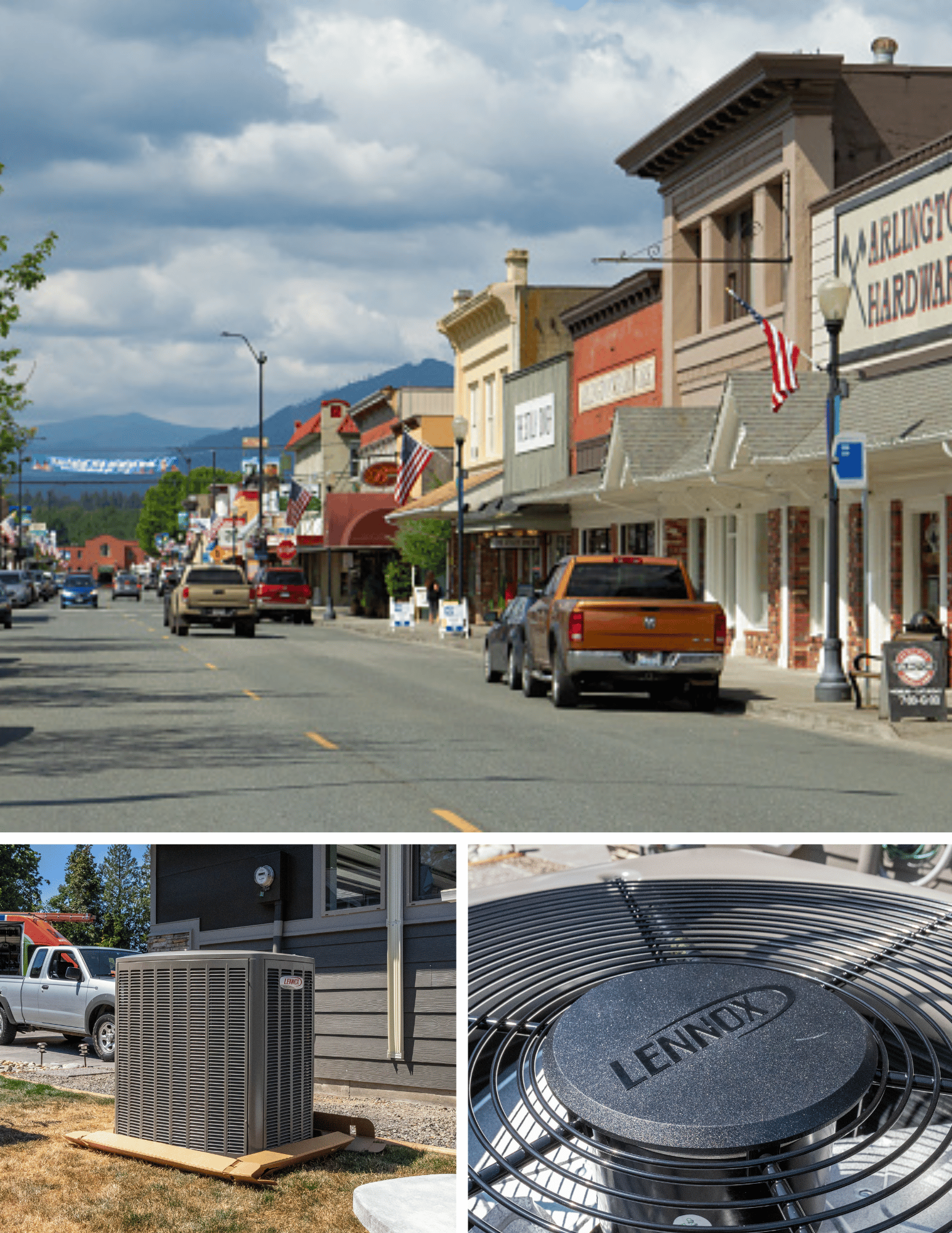
Benefits of Regular Maintenance:
- Increased Efficiency: Well-maintained units use less energy, lowering your utility bills.
- Extended Lifespan: Routine care can prolong the life of your AC system.
- Improved Air Quality: Clean filters and components mean cleaner air in your home.
- Fewer Breakdowns: Preventative maintenance reduces the likelihood of unexpected failures.
Common AC Repairs
Even with regular maintenance, some issues may still arise. Here are a few common problems and their solutions:
- Refrigerant Leaks: Low refrigerant levels can cause your AC to cool inefficiently. Technicians will locate and repair leaks, then recharge the system.
- Electrical Issues: Faulty wiring or electrical components can prevent your AC from running. Skilled technicians can diagnose and fix these problems safely.
- Component Failures: Parts like compressors, fans, and motors can wear out over time. Replacing these components promptly ensures your system continues to operate effectively.
Importance of Timely Repairs:
- Prevent Further Damage: Addressing issues early can prevent more extensive damage to your system.
- Maintain Comfort: Quick repairs ensure your home stays cool and comfortable.
- Save Money: Early intervention can save on more expensive repairs or replacements down the line.
For reliable air conditioning installation in Mount Vernon, WA, and top-notch maintenance and repair services, contact Clean Air Heating & Cooling. Regular maintenance and timely repairs will keep your AC system running at its best, ensuring a comfortable home environment year-round.
Frequently Asked Questions about Air Conditioning Installation in Mount Vernon, WA
How much does it cost to install AC in Washington?
The cost of air conditioning installation in Mount Vernon, WA can vary greatly. On average, homeowners can expect to pay between $6,000 and $10,000. This range includes both the unit and labor costs. Factors that influence the cost include the type of system, the size of your home, and any additional features you may want.
Why does it cost so much to install an AC unit?
Several factors contribute to the higher costs of installing an AC unit:
- Ductwork: If your home doesn’t already have ductwork, installing it can significantly increase the cost. Properly sized and sealed ducts are essential for efficient cooling.
- Installation Complexity: The more complex the installation, the more labor is required. For example, installing a unit in a multi-story home can be more challenging than in a single-story home.
- Permits and Inspections: Mount Vernon requires permits and inspections for AC installations, which add to the cost but ensure the job is done correctly and safely.
How much does it cost to install a wall-mounted AC unit?
Installing a wall-mounted AC unit, such as a ductless mini-split, generally costs between $3,000 and $5,000. This price includes both the unit and labor. Factors affecting the cost include:
- Material Cost: The price of the AC unit itself can vary based on brand, capacity, and features.
- Labor Cost: Professional installation ensures the unit is mounted correctly and operates efficiently. Labor costs can vary based on the complexity of the installation and the technician’s experience.
For more information on air conditioning installation in Mount Vernon, WA, contact Clean Air Heating & Cooling. We provide free estimates and guarantee high-quality service to keep your home comfortable year-round.
Conclusion
Installing an air conditioning system is a significant investment that can greatly enhance your comfort and quality of life. From understanding the installation process to choosing the right system for your home, make informed decisions. The right AC system can offer improved energy efficiency, lower utility bills, and a more comfortable living environment.
At Clean Air Heating & Cooling, we pride ourselves on providing top-notch air conditioning installation in Mount Vernon, WA. Our team of experienced technicians is committed to ensuring your home stays comfortable throughout the year. Whether you need a new installation, regular maintenance, or emergency repairs, we are here to help.
For a free, no-obligation estimate or to learn more about our services, please visit our Skagit County service page or call us at (360) 398-9400. Let us help you achieve the perfect indoor climate for your home!

